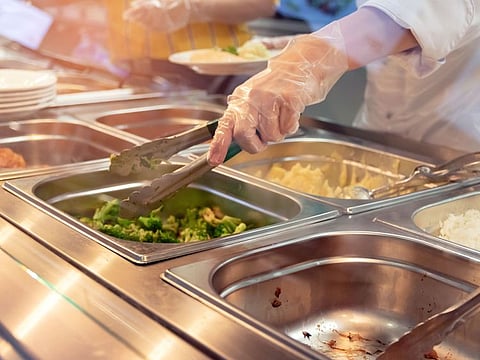Is your office canteen good or bad?
Do you have a canteen in your office? Do you hate it or love it?

HIGHLIGHTS
- Do you have a canteen in your office?
- Do you hate it or love it?
- What would be an ideal office canteen?
Dubai: Food matters. Ask anybody, especially when you spend long hours in the work place - good food helps bring a welcome sense of wellbeing and energy to keep going.
Some prefer homecooked meals, but for most trying to battle the race aginst time, eating out is the main option. Then you have the issue of budgets. A happy meeting place would be a great office canteen, which made us ask our readers this question on Instagram.
Do you have a canteen in your office? Do you hate it or love it? What would be an ideal office canteen?
Out of 505 UAE-based respondents, 213 users said they had office canteens, while 292 did not.
Rating their office canteens, a majority of people indicated that their office canteens were not, well, that great. We decided to dig a bit deeper and speak to people....
Serve the basics
Judith Rose works as a commercial manager in Dubai. The Filipina has been patronising her office canteen for 10 years. She said: “Our office cafeteria is a combination of a food court and restaurant. It caters to a variety of taste buds, dietary requirements and budget. Our lunch menu changes but the constant thing is their sandwiches, sushi, salads, pizza, pasta and my favourite is the Indian chaat stall. For an office set up, the variety and food selection is excellent. I usually spend Dh14-Dh28 in the canteen in a day, but I save around Dh20 per day when I bring food from home.”
Our office cafeteria is a combination of a food court and restaurant. It caters to a variety of taste buds, dietary requirements and budget.

When asked what would be an ideal canteen?
Rose said: “It is difficult to have an ideal canteen because everyone has different tastes, disposable incomes and dietary requirements. But it is best and the healthier and cost-effective option to bring food from home. Canteens should serve the basics, which is hot and cold drinks, a snack menu such as sandwiches and salad and ethnic foods of the employees.”
Cozy but costly
A Filipino banker in Dubai for four years described their office cafeteria as clean and classy.
Sylvester Lopez Doctora said: “They have Indian and Arabic food on their regular menu. The ambience is cozy, the price is slightly costly, but affordable and the taste is good but can be better. I have been going to this cafeteria for two years now, since I joined the company. I usually spend Dh20 for lunch if I buy from the canteen. Cooking my own food and bringing food to office are healthier than buying from a cafeteria - I can choose the healthy ingredients at the grocery and it is more cost effective if I buy and cook.
For employees to like the office canteen, they should serve healthy food, be clean and provide more variety of foods at less cost.

“For employees to like the office canteen, they should serve healthy food, be clean and provide more variety of foods at less cost. Since a lot of expatriates are living and working here, they should consider a variety of cuisines that could accommodate the palatability of each worker. Serving healthy food is paramount to sustain the well-being of its employees.”
Indian banker Shubham D. added that his canteen as slightly costly but said that they have a variety of options. He said: “We have salads, packed sandwiches, healthy drinks and meal options. They are slightly costly but the food tastes decent.”
The 34-year-old who lives alone in the UAE has been working in the same office for four years. He regularly eats from his office canteen. He added: “It is convenient because I don’t have to cook and carry food from home.”
Canteens should cater to different tastes
UAE expatriate Evelyn Otiato from Kenya said she works in an Indian office that does have a canteen. However, it caters only to Indian taste. She said: “We have multinational staff, but that is not considered. They provide only Indian food.”
She feels companies must consider the multinational work environment and cater to all taste buds. Evelyn added: “Being an African, it’s very difficult to find our own type of food in canteens. The food that my office canteen provides is always less in quantity, not hot or fresh. It is coloured with turmeric or has chilli powder that makes it extremely spicy.”
We have multinational staff, but that is not considered. They provide only Indian food.

Evelyn does however eat from there, she added: “I always find something with less spice.”
Filipina expatriate Les Torres, a secretary in Dubai for 14 years said: “Our office canteen offers quite a variety of food. Since the majority of staff are Indians, the menu is mostly for Indians but sometimes they also cater to other nationalities serving oriental cuisines like fish fillet, chicken satay and noodles. But of course their menu can be improved. The average price for their lunch is just alright, but the taste can be improved. They have a nice variety of salads.”
Not that great
For Syrian national Fares Hassan, his office canteen is not that great. The manager of a trading company said: “I have worked in three different workplaces in the UAE, and I never liked canteen food. First of all, the food is rarely fresh, since it is prepared in advance. Most companies hire caterers to cook the food so pre-prepared food is transported. When we purchase the food it has to be re-heated. For the money they take for the packed food, it rarely has the freshness or nutritional value. I know it is too much to expect great food, but I feel office canteen food generally doesn’t taste that great. We still end up buying the food when there is no other option.”
Not cost-effective
Dubai resident Jisen Raj has a canteen at his place of work and he rates it an eight on 10. The 23-year-old Indian trainee wealth advisor said: “There is nothing I dislike about our canteen. The person who serves us is really sweet. The coffee and tea served is free. The sandwiches are great and they have chocolates but those are a tad bit expensive.”
While Raj said he did not have any suggestions to improve the quality of the food, he would like the prices of some snacks served to come down a little.
Filipina Michelle Cordoviz, office administration and HR assistant in Dubai for 12 years, said: “My previous company had an office cafeteria and I was their regular customer for almost a year. They served mostly cereals, fruits and eggs for breakfast and they regularly offered Indian and Arabic food and salad for lunch. The cost per meal is around Dh20-Dh30, but the food taste is sometimes bland.”
I used to cook and bring a lunch bag as it is more cost-effective and safer, and of course more tasteful. I can save a lot

Cordoviz decided to prepare and bring food from home and started saving Dh150 every week. She said: “I used to cook and bring a lunch bag as it is more cost-effective and safer, and of course more tasteful. I can save a lot."
In-house chef
At her current workplace, Cordoviz said they have a resident chef catering for breakfast and lunch for free. She said: “The chef serves sumptuous food and a variety of dishes. I think it would be ideal for employers to provide their employees with a nutritionist in the office or a resident chef to serve healthy and good food. Nowadays most people are more health conscious, so they will order healthy food online for delivery or if they have time prepare food at home and bring to office, which is more cost-effective. For employees to patronise their office cafeteria, it should serve tasty good meals and healthy nutritious food.”
Depends on the catering company
Sudanese national Zeinab Mohammad Ali likes her office canteen. The Dubai-based senior demand planner said: “I like the salad bar we have at work, and the live cooking stations. I dislike the desserts’ bar as there aren’t many options to choose from.”
Zeinab, 26, added that she liked the canteen area because it was nice and spacious: “Since the catering is done by a hotel company, the food is always warm. I wouldn’t change anything about it. Initially, the food wasn’t that good, but we voted and they changed the catering company.”
No canteen at all
Graphic designer Toulin Khalil does not have access to an office canteen but she isn’t complaining. The Dubai-based Jordanian national said: “It is not an issue for me because I have options nearby. I have restaurants close by and I can choose any one to eat from. Sometimes I even order food to work.”
Are office canteens necessary?
Like Khalil, 23-year-old Pakistani national Wasif Naushad does not have a canteen at his workplace, but does not find it to be an inconvenience. He said: “I work in Dubai International Financial Centre so there are many lunch options available for me. However, when I used to work in Ajman Freezone, it was really difficult. We did not have a canteen and no restaurant was willing to deliver food to my location.” He said that having a canteen at work would be more convenient.
I work in Dubai International Financial Centre so there are many lunch options available for me. However, when I used to work in Ajman Freezone, it was really difficult.

Lebanese national Christina C. does not have an office canteen and is unhappy about this. The 33-year-old told Gulf News: “We don’t have a canteen. We barely have a tiny place to sit and eat at. I would give the space a two out of ten points, simply because it is small and can hardly fit five people at one time.
“People take shifts to go eat so the later you go, the dirtier you will find the area. I would prefer to have a proper canteen with food for a discounted price for employees. The whole ‘canteen’ we have needs revamping.”
Indian national Aman Anand is used to not having a canteen at his place of work, but what he wants is being able to easily get a cold coffee in the afternoon. The 24-year-old said: “It is hard to get out of work sometimes. In the summer heat, it is harder. I would like a functioning canteen with simple lunch items to be served. I usually have to go out to a nearby restaurant for lunch.”
I would like a functioning canteen with simple lunch items to be served. I usually have to go out to a nearby restaurant for lunch.

Why are healthy canteens necessary?
Poor nutrition affects workers’ health and productivity. It is detrimental to an employee’s wellbeing as well as a workplace’s progress.
According to the UN’s International Labour Organisation, poor eating habits during working hours are costing nations around the world up to 20 per cent in lost productivity. The report discusses how low iron, obesity, and malnutrition leads to inefficiency.
Saumya Mishra is a nutritionist based in Dubai who believes that bringing food from home is the best option for an employee. “It is cost effective and ensure proper nutrition,” she said.
While the idea of bringing food from home seems cost-effective and convenient, it is not practical for many. The reality is that many employees depend on food from elsewhere. This comes with a number of issues.
Local restaurants can be unaffordable or have minimum options. Workers end up snacking on unhealthy vending machine and canteen snacks.
A typical work day meal should have right balance of macro nutrients - carbohydrates, protein, fresh greens and essential fats.

Mishra noted that those who depend on food served at office canteens need to be wary of what they are eating. On the other hand, such facilities need to cater to everyone’s tastes and preferences, especially in a place like the UAE that is home to many cultures.
“An ideal office canteen’s menu would depend on what is the ratio of different nationalities working there,” she said.
Mishra believes that no matter what the background of those working at an office is, nutritional options are necessary at canteens.
“Healthy canteens are the need of the hour in today’s lifestyle as we spend almost eight to twelve hours at work,” she said.
An ideal canteen meal broken down
Speaking about nutrition, she said: “A typical work day meal should have right balance of macro nutrients - carbohydrates, protein, fresh greens and essential fats.”
Mishra suggested that carbohydrates should make up to 25 to 30 per cent of the total meal. This could be taken as whole grains in the form of pasta, bread, brown rice, whole grain roti (Indian flatbread) or Arabic flatbread. “Typically these should take up 1/4th of the plate,” she said.
Protein should also ideally make up 25 to 30 per cent of the meal and should include good quality lean protein coming from chicken, fish, lentils or beans.
“It is important to note that these are sourced from fresh produce and not canned or frozen ones,” she said.
When it comes to healthy fats, the medium of cooking plays an important part.
“Good quality oil should be used. Office canteens should not reuse previously heated oil. This changes the molecular structure of the fats, making them extremely harmful for heart health,” Mishra warned.
Fats should make up 15 to 20 per cent of the meal, according to the expert.
Salads are a good way to include greens in a meal. A salad bar is an ideal way to provide healthy options at an office canteen but there are some things to look out for.
Mishra said: “Cold pressed olive oil should be used for salad dressings or grilling purposes. Minimising the use of cheese or cream based dressings and mayonnaise will make a difference.”



